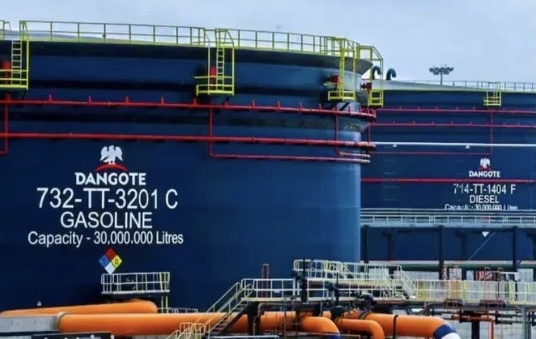KEY POINTS
- Dangote refinery now supplies 20 million litres of fuel daily.
- NMDPRA plans to establish a National Strategic Petroleum Stock.
- Nigeria aims for energy self-sufficiency and reduced reliance on imports.
The Nigerian Midstream and Downstream Petroleum Regulatory Authority has confirmed that the Dangote refinery, with a capacity of 650,000 barrels per day, is now a central player in Nigeria’s domestic fuel market. According to its Chief Executive, Farouk Ahmed, the refinery is contributing an average of 20 million litres of fuel daily, a shift that signals growing confidence in the country’s refining future and energy independence.
Dangote refinery daily fuel supply boosts confidence
Ahmed, who spoke in Lagos at the annual conference of the Association of Energy Correspondents of Nigeria, said the refinery’s operations mark a turning point in Nigeria’s long effort to secure local refining capacity. Represented by the NMDPRA spokesperson, George Ene-Ita, he explained that the refinery’s contribution has changed the supply landscape, offering Nigerians a dependable source of petrol while easing the burden on imports.
He noted that with Nigeria’s daily consumption averaging around 50 million litres, Dangote’s supply already accounts for a significant portion of local demand. The refinery, he added, has also exported over one billion litres of petrol between June and September to markets including the United States, underscoring its scale and competitiveness.
Strategic stock plan to safeguard supply
According to Punch, Ahmed said the NMDPRA views the refinery’s success as evidence of Nigeria’s maturing downstream sector, but stressed that long-term stability requires stronger infrastructure and resilience. He announced plans to operationalise the National Strategic Petroleum Stock, a buffer designed to guard against major supply disruptions.
The Authority, he said, is tightening standards for depot operations, licensing, and product monitoring to prevent hoarding and adulteration while enhancing road safety in fuel transport.
Ahmed reiterated that the NMDPRA’s mandate under the Petroleum Industry Act 2021 is to promote fair regulation, transparency, and investor confidence. He said the agency continues to engage operators, labour, and the media to ensure reforms have real impact.
Describing the Dangote refinery as a symbol of industrial renewal, Ahmed said it is central to Nigeria’s goal of fuel sufficiency, job creation, and foreign exchange savings. He also highlighted the Authority’s wider agenda to expand gas utilisation and clean energy adoption, setting Nigeria on a path toward becoming a regional energy hub.
“Every regulatory decision,” Ahmed said, “will be judged not by paperwork but by whether Nigerians see better outcomes in their daily lives.”



